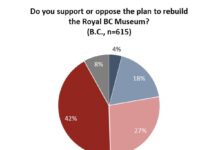AGAINST the backdrop of record deaths and calls from top cops to decriminalize the possession of hard drugs, a comprehensive new study of 5,003 Canadian adults from the Angus Reid Institute finds two trends defining the opioid epidemic in the public discourse.
Seven-in-ten Canadians say that they feel the problem of opioid addiction has worsened over the past year in Canada. For half (48%), it is a worsening in their own community.
While a majority recognize this broad trend, far fewer Canadians have had the energy or time to focus on the issue. In February 2019, fully two-in-five (42%) said they were following it closely and having discussions about it with their friends and family. Now, as COVID-19 consumes their personal bandwidth, just 16 per cent say the same.
Most, however, are calling for action. A majority in every province canvassed support the decriminalization of all illegal drugs (with the exception of those in Saskatchewan and New Brunswick, where nearly half do). It is a move advocates say would reduce the risk to users by improving the quality of supply whilst encouraging people who use drugs to seek treatment without stigma. Further, two-thirds support increasing access to supervised injection sites.
Opponents suggest that liberalizing Canada’s drug laws is not the answer and support a tougher approach. Nearly half (45%) say it would be better to “get tough” on users by increasing arrests and charges for possession of illicit substances.
More Key Findings:
- Canadians from coast-to-coast are critical of their provincial governments’ handling of this issue. A majority in each province, with the exception of Quebec, say their province is doing a poor job on this file
- The issue is perceived as more serious in urban areas, where 68 per cent say it is a problem to be dealt with. That said, fully half (53%) of rural residents feel the same about their community
- Majorities of past Conservative (63%) and Bloc Quebecois (57%) voters say that increasing punitive measures against people who use drugs is the right policy to pursue
- Among those who report knowing someone who became dependent on these substances, two-in-three (63%) say that person either did not seek help or sought help but had a difficult time finding it
- One-in-ten British Columbians (11%) say they know someone who has died due to an overdose from opioids, compared to 5 per cent who say this overall













